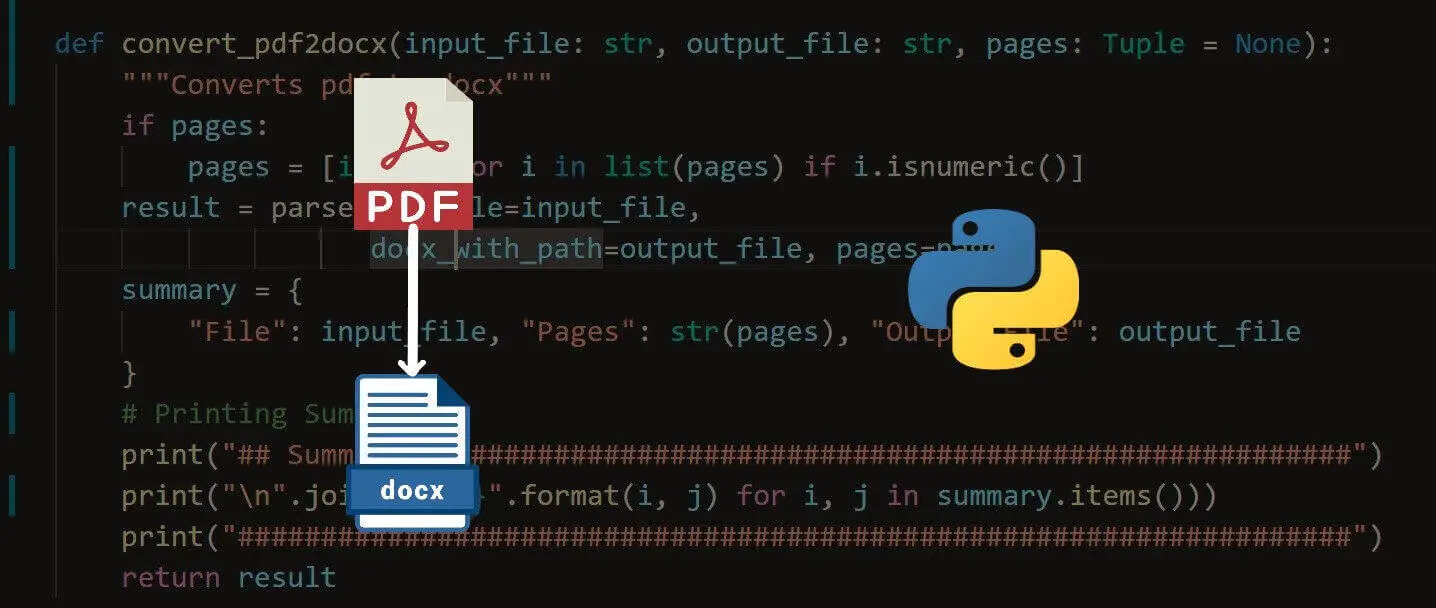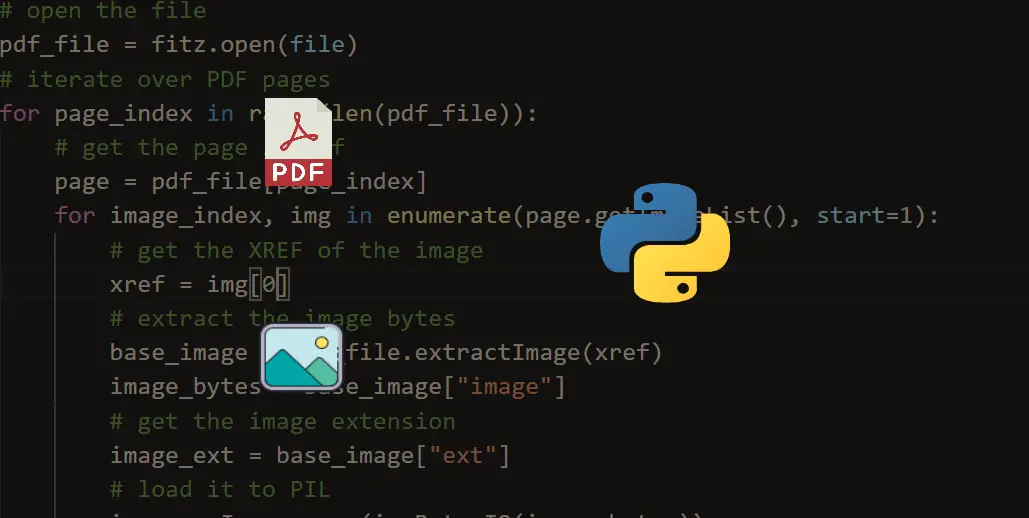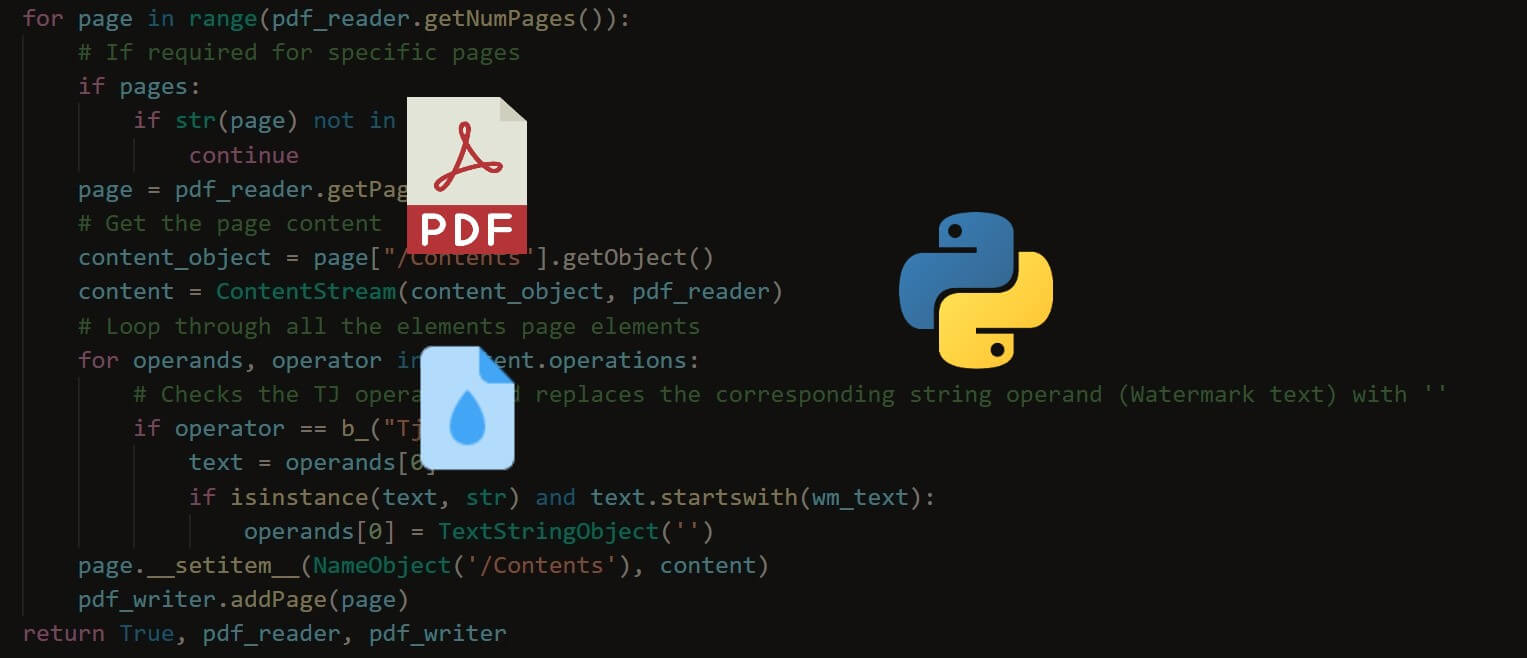Welcome! Meet our Python Code Assistant, your new coding buddy. Why wait? Start exploring now!
There are various tools to convert PDF files into images, such as pdftoppm in Linux. This tutorial aims to develop a lightweight command-line tool in Python to convert PDF files into images.
We'll be using PyMuPDF, a highly versatile, customizable PDF, XPS, and eBook interpreter solution that can be used across a wide range of applications such as a PDF renderer, viewer, or toolkit.
Download: Practical Python PDF Processing EBook.
First, let's install the required library:
$ pip install PyMuPDF==1.18.9Importing the libraries:
import fitz
from typing import Tuple
import osLet's define our main utility function:
def convert_pdf2img(input_file: str, pages: Tuple = None):
"""Converts pdf to image and generates a file by page"""
# Open the document
pdfIn = fitz.open(input_file)
output_files = []
# Iterate throughout the pages
for pg in range(pdfIn.pageCount):
if str(pages) != str(None):
if str(pg) not in str(pages):
continue
# Select a page
page = pdfIn[pg]
rotate = int(0)
# PDF Page is converted into a whole picture 1056*816 and then for each picture a screenshot is taken.
# zoom = 1.33333333 -----> Image size = 1056*816
# zoom = 2 ---> 2 * Default Resolution (text is clear, image text is hard to read) = filesize small / Image size = 1584*1224
# zoom = 4 ---> 4 * Default Resolution (text is clear, image text is barely readable) = filesize large
# zoom = 8 ---> 8 * Default Resolution (text is clear, image text is readable) = filesize large
zoom_x = 2
zoom_y = 2
# The zoom factor is equal to 2 in order to make text clear
# Pre-rotate is to rotate if needed.
mat = fitz.Matrix(zoom_x, zoom_y).preRotate(rotate)
pix = page.getPixmap(matrix=mat, alpha=False)
output_file = f"{os.path.splitext(os.path.basename(input_file))[0]}_page{pg+1}.png"
pix.writePNG(output_file)
output_files.append(output_file)
pdfIn.close()
summary = {
"File": input_file, "Pages": str(pages), "Output File(s)": str(output_files)
}
# Printing Summary
print("## Summary ########################################################")
print("\n".join("{}:{}".format(i, j) for i, j in summary.items()))
print("###################################################################")
return output_filesThe above function converts a PDF file into a series of image files. It iterates through the selected pages (default is all of them), takes a screenshot of the current page, and generates an image file using the writePNG() method.
You can change the zoom_x and zoom_y to change the zoom factor, feel free to tweak these parameters and rotate variable to suit your needs.
Let's use this function now:
if __name__ == "__main__":
import sys
input_file = sys.argv[1]
convert_pdf2img(input_file)Get Our Practical Python PDF Processing EBook
Master PDF Manipulation with Python by building PDF tools from scratch. Get your copy now!
Download EBookLet's test the script out on a multiple-page PDF file (get it here):
$ python convert_pdf2image.py bert-paper.pdfThe output will be as the following:
## Summary ########################################################
File:bert-paper.pdf
Pages:None
Output File(s):['bert-paper_page1.png', 'bert-paper_page2.png', 'bert-paper_page3.png', 'bert-paper_page4.png', 'bert-paper_page5.png', 'bert-paper_page6.png', 'bert-paper_page7.png', 'bert-paper_page8.png', 'bert-paper_page9.png', 'bert-paper_page10.png', 'bert-paper_page11.png', 'bert-paper_page12.png', 'bert-paper_page13.png', 'bert-paper_page14.png', 'bert-paper_page15.png', 'bert-paper_page16.png']
###################################################################And indeed, the images were successfully generated:
 Conclusion
Conclusion
We hope that you find this tutorial helpful for your needs, here are some other PDF tutorials:
- How to Watermark PDF Files in Python.
- How to Highlight and Redact Text in PDF Files with Python.
- How to Extract Images from PDF in Python.
- How to Extract All PDF Links in Python.
- How to Extract Tables from PDF in Python.
- How to Extract Text from Images in PDF Files with Python.
- How to Convert PDF to Docx in Python.
Finally, unlock the secrets of Python PDF manipulation! Our compelling Practical Python PDF Processing eBook offers exclusive, in-depth guidance you won't find anywhere else. If you're passionate about enriching your skill set and mastering the intricacies of PDF handling with Python, your journey begins with a single click right here. Let's explore together!
Check the full code here.
Happy coding ♥
Take the stress out of learning Python. Meet our Python Code Assistant – your new coding buddy. Give it a whirl!
View Full Code Analyze My Code




Got a coding query or need some guidance before you comment? Check out this Python Code Assistant for expert advice and handy tips. It's like having a coding tutor right in your fingertips!